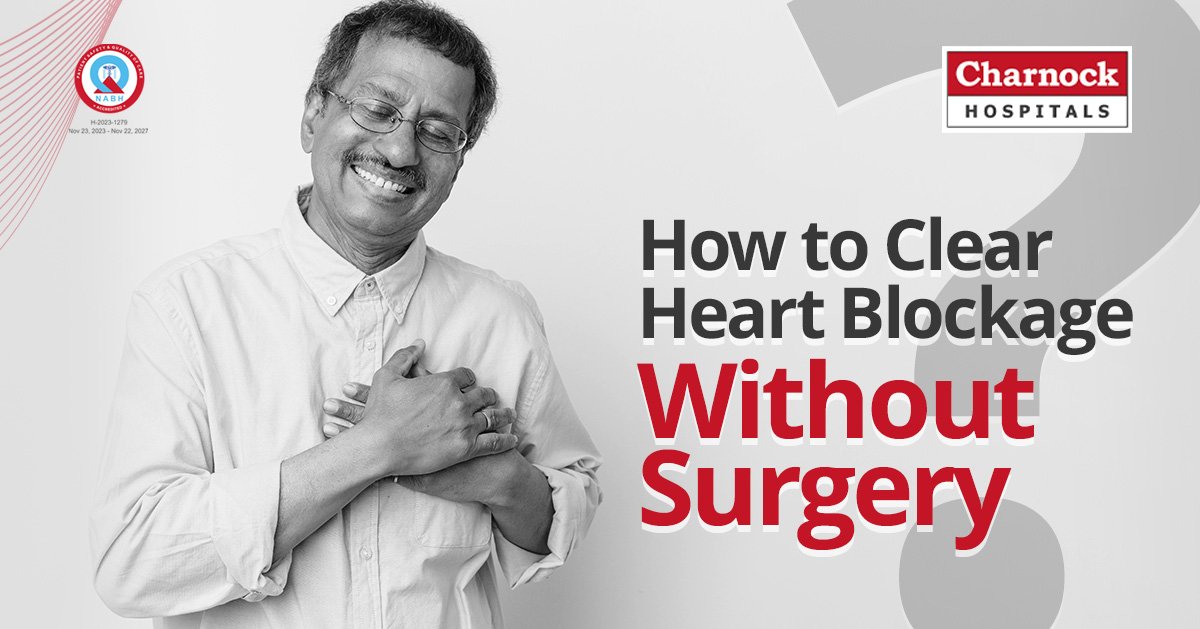Are you seeking non-surgical approaches to clear your arteries? Treating heart blockage surgically can be concerning to you due to factors like cost, fear of surgery, potential risks, recovery time, long-term effectiveness, etc. Keep reading to learn more about heart blockage and its alternative treatment methods.
What is heart blockage?
Heart blockage or Coronary Artery Disease (CAD) results from plaque buildup in the arteries. This occurs when sticky substances made of fat, cholesterol, etc. accumulate in the arteries, narrowing or blocking the blood supply to the heart.
Charnock Hospital’s Cardiology department is led by the best Cardiologists in India, trained worldwide for the treatment of heart diseases. Book an appointment now to get expert advice for your cardiac concerns.
What are the possible causes of heart blockage?
Heart blockage can be caused due to several reasons. Some of them are:
- Autoimmune diseases
- Genetic abnormalities
- Obstructive Sleep Apnea (OSA)
- Side effects of certain medications
- Exposure to toxic substances
- Medical conditions
- Certain infections
- Poor lifestyle choices
What are the symptoms of heart blockage?
If the arterial plaques are left untreated, it hardens, leading to a range of symptoms from mild, to moderate to severe. Some of these are
- Nausea
- Dizziness
- Fatigue
- Lightheadedness
- Heart palpitations
- Inability to perform routine activities
- Irregular heartbeat
- Pain in chest
- Difficulty in breathing
People experience different symptoms based on their age, gender, physical activity level, blockage severity, blockage location, duration of blockage, medical history, and underlying health issues.
How to treat heart blockage without surgery?
The treatment for heart blockage without surgery differs on factors such as
- Type of heart block
- the severity of heart block
- The symptoms you are experiencing
The common methods for treating heart blockage without surgery are
Angioplasty: Angioplasty or Balloon angioplasty is a heart procedure performed to open narrowed or blocked arteries, which causes chest discomfort or a heart attack. A catheter (thin tube) is placed in the blood vessel and guided to the heart by X-rays and contrast dye. A tiny inflated balloon at the tip of the catheter is used to expand the artery by pushing the arterial plaque aside. At times, a stent (wire mesh tube) is also inserted to keep the artery open. This procedure takes about 30 minutes to several hours. Angioplasty helps to relieve symptoms, increases blood flow to the affected area, and lowers further risks of heart issues in the long run.
Stent placement: Stent placement is a heart procedure often performed in combination with an angioplasty, where a wire mesh tube is placed inside the artery permanently. Stents help to keep the narrowed or blocked artery open, thereby improving blood flow and reducing heart blockage symptoms.
Medication management: Some heart block symptoms can be managed when the cardiologist changes the prescribed drugs. This will help to reduce the symptoms and lower the risk of heart issues developing further.
Lifestyle changes: Opt for healthy habits that will help to lessen the cardiac symptoms and the risk of it developing further.
- Restrict your intake of foods rich in trans and saturated fats.
- Eat heart-healthy foods rich in fiber, antioxidants, and omega-3 fatty acids.
- Do any physical activity of your choice regularly.
- Quit social habits such as alcohol use and smoking.
- Relieve your stress by engaging in your favorite hobbies.
- Be regular in taking your prescribed medications.
- Maintain a healthy weight.
If you experience any heart block symptoms that last for more than a few minutes, seek medical help and get treated immediately. Get routine health check-ups to be aware of your body’s condition.
Frequently Asked Questions (FAQs)
- What exercise is good for heart blockage?
Exercises such as walking, light cycling, gentle swimming, etc. are good for people with heart problems. Do it at a pace that you are comfortable with and don’t exhaust yourself as it will lead to complications. Experts recommend 30 minutes of physical activity daily to keep your heart healthy.
- How to diagnose heart blockage?
Heart blockage can be diagnosed using tests such as Electrocardiogram (ECG), Echocardiogram, Electrophysiology test, imaging tests like CT scan or magnetic resonance angiography, cardiac catheterization, and angiogram. If the symptoms persist for more than a few minutes, seek immediate help and get treated in the nearby hospital.
- Can heart blockage be cleared?
Yes, heart blockage can be cleared with surgical methods, non-surgical methods, and lifestyle alterations. Be consistent with health check-ups and lifestyle changes to improve overall health, reducing potential complications.
- Can heart blockage be prevented?
Yes. Heart blockage can be prevented by cultivating a healthy lifestyle. Eating a balanced diet, exercising daily, quitting smoking and alcohol, de-stressing, and managing medical conditions, if any, will help prevent heart issues.
- Can you recover from a heart block?
Yes, you can recover from a heart block. The time of recovery differs based on the individual and the treatments provided. Lifestyle management and medication adherence are crucial for preventing the recurrence of heart issues and its further development.




0 Comments